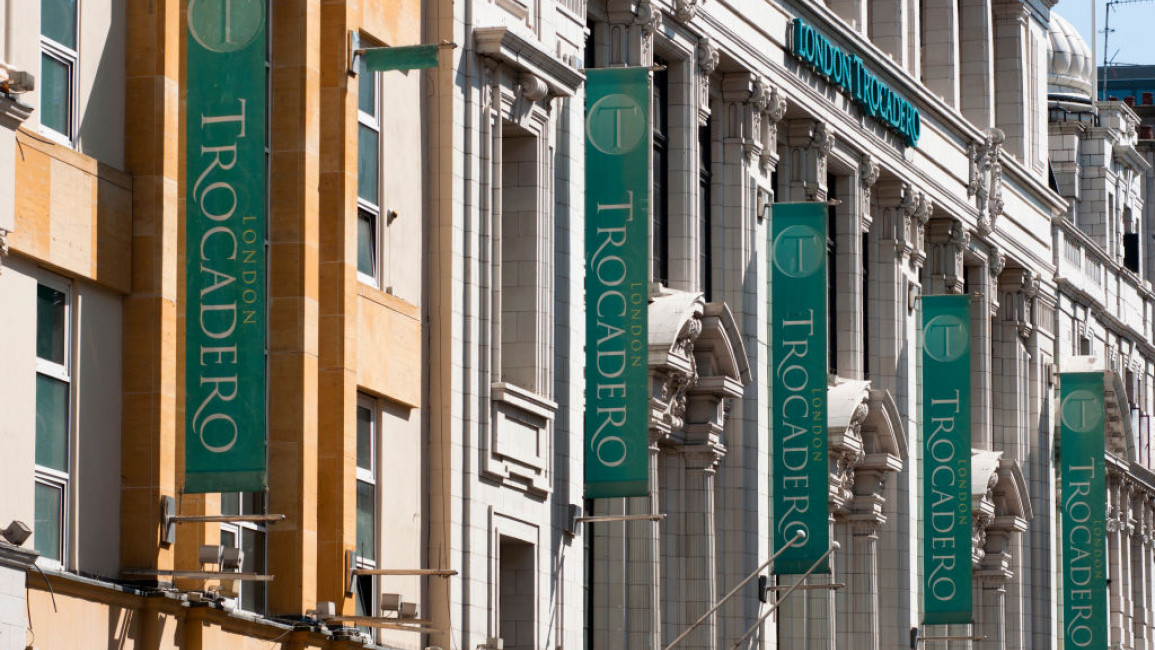
London’s Trocadero mosque: Britain is happy to take Muslims’ money & labour without catering for their needs
As a Muslim living in London, it can sometimes be tempting to forget that Britain is a nation in which islamophobia still reigns supreme. In certain pockets of the capital, it’s difficult to leave the house without seeing abayas and thobes, niqabs and hijabs. On Fridays, Muslim uncles spill out of mosques on street corners and during Ramadan some parts of the city turn nocturnal with chai spots open until dawn. As a teacher in East London, I’ve called out names like Muhammed and Maryam in the register far more times than Melissa and Michael. But the briefest look at some of the reactions to plans to turn the iconic West End Trocadero building into a mosque is enough to remind anyone of the status Muslims still inhabit in the minds of many - even in a city as diverse as London.
According to the 2021 national census, there are 3.9 million Muslims in the UK and 1.3 million of these live in London. Whilst the Muslim community accounts for roughly 6.5% of Britain, this skyrockets to 15% of London’s population. In fact, more Muslims live in the London Borough of Tower Hamlets than in the entire city of Manchester. And if global trends of Islam being the world’s fastest growing religion are anything to go by, it is more than likely that the capital’s Muslim community will continue to expand in years to come.
''These objections would be disappointing if they weren’t so downright hypocritical. The West End is not the monopoly of the imagined white liberal artsy elite. The entertainment venues that are the beating heart of the area rely on migrant labour as much as the rest of the country does. If Britain is content with paying migrant workers (many of whom will be Muslim) meagre wages to cook them a tikka masala after their matinee then the least they can do is allow them somewhere to pray in their break.''
Perhaps it’s little wonder then that Muslims are crying out for more prayer spaces in London. Islam is a religion that mandates communal worship at least once a week and recommends it strongly at other times.
But at a time when life in Britain is more hostile than ever, the social, economic and practical demands of mosque spaces are amplified, becoming nothing short of a lifeline for a demographic as impoverished and persecuted as Muslims in Britain. When the government deliberately manufactures an atmosphere of hostility, economic hardship and social isolation for minorities, spaces like mosques fill the vacuum.
Muslims are a group most impacted by the cost of living crisis, falling into poverty at a rate ten times higher than the national average. And so mosques, by default, have become places where people can come to eat and access somewhere safe in the face of waning government help. With the obliteration of youth centres and affordable childcare, they are places for Muslim children to not only learn about their faith, but also provide a crucial safe alternative to the crime and violence that awaits them on street corners.
Many mosques provide support for those struggling with the insurmountable admin required for living in the UK - from navigating deliberately confusing benefits applications to providing legal and immigration advice to those who couldn’t otherwise afford it, running free exam tuition for families who can’t afford a private tutor, and language lessons for migrants. With the political horizon as bleak as it is in Britain, there’s never been a greater need for the stability that mosques provide.
So when, back in 2005, Muslim property tycoon and philanthropist Asif Aziz bought the iconic Trocadero building in the heart of the West End of London and then in 2020 submitted plans to turn part of the building into a mosque, much of the Muslim community celebrated this.
After all, the once iconic Trocadero building has sat vacant for years, and Muslims who work, live or frequents the West End have struggled to find somewhere to pray in the area. Yet seemingly for some, the idea of a multi-million pound property languishing unused was better than the notion of it being used for Muslims, and the planning application was inundated with so many racist comments that it was forced to withdraw completely.
Far-right group Britain First even started a petition against the creation of a mosque and others objected to the presence of Islam so close to Soho, opposing the ‘sacrifice’ of a historic building to a religion they don’t consider native to Britain.
Three years on and plans for the mosque are finally going ahead – albeit a much smaller version. Dubbed the ‘Piccadilly Prayer Space’, its promises to use the centre to promote interfaith dialogue, house a reflection space for all faiths and a café. However, this has done little to curb the islamophobic outrage.
Britain First has once again launched a petition, with their leader Paul Golding rather inaccurately Tweeting that the Trocadero is being turned into a “mega mosque”. Even a cursory search of the building’s name on social media reveals references to Muslims as “rats”, “scum” and “terrorists”, theories of a Muslim takeover plot and claims that Muslims are using this to turn the UK into a second Mecca. A reminder if one was ever needed, that even accounting for 15% of a city’s population is not enough to humanise us in the eyes of those intent on questioning our mere right to exist.
The thing is, these objections would be disappointing if they weren’t so downright hypocritical. The West End is not the monopoly of the imagined white liberal artsy elite. The entertainment venues that are the beating heart of the area rely on migrant labour as much as the rest of the country does. If Britain is content with paying migrant workers (many of whom will be Muslim) meagre wages to cook them a tikka masala after their matinee then the least they can do is allow them somewhere to pray in their break.
The arts are already hugely dominated by the wealthy and the white - and the inaccessibility of the sector is compounded by how inaccessible areas like the West End physically are to those who don’t fit the stereotype of a theatregoer.
I’ve seen the looks on student’s faces as they’re gawped at for turning up to a theatre in a abaya or being forced to go home early because there’s nowhere to pray nearby. And that obstacle alone is enough to keep cultural centres like the West End an enclave of the privileged (and, the non-Muslim).
Instead of seeing the planned ‘Piccadilly Prayer Space’ as an intrusion, it should be seen as opening up a threshold to more communities being able to access the cultural capital that the West End can offer - particularly young people from already disadvantaged backgrounds.
Above all, we can’t truly understand the Trocadero without looking at its context. Yes, it is in the centre of theatreland, but it is also housed in the borough of Westminster - the pinnacle of British class division with the super-rich living in the shadow of tower blocks, the nucleus of political power alongside some of the nation’s poorest residents.
The number of Muslims in Westminster has grown exponentially in recent years - from 12% in 2011 to almost 15% in 2021 and the area suffers the crippling double jeopardy of higher than average rent prices alongside lower than average wages. Why would a community hub that can provide shelter and safety (where government fails) to a large contingency of the borough’s residents be anything short of a welcome addition to the capital’s West End?
Reactionary headlines aside, the Trocadero will hardly be the first British icon owned by a Muslim. Whether it’s the Shard, Harrods, ASDA or practically the whole of Canary Wharf, Muslim money already pumps through the city of London. The willingness to accept the economic fruits of Muslim investment without humanising us enough to allow us a mere basement to pray in the capital exposes just how deeply-rooted islamophobia truly is in Britain and how far we are from eradicating it.
Nadeine Asbali is a secondary school teacher in London.
Follow her on Twitter: @najourno
Have questions or comments? Email us at: editorial-english@newarab.com
Opinions expressed here are the author's own, and do not necessarily reflect those of their employer, or of The New Arab and its editorial board or staff.




